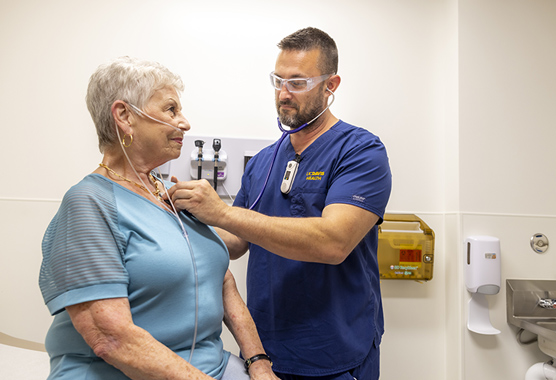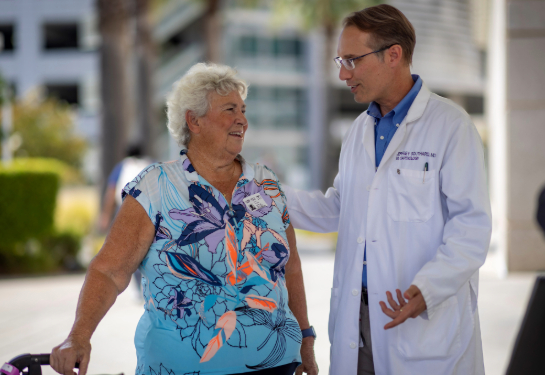Atrial Fibrillation
Our heart specialists are experts in diagnosing and treating AFib. We’ll work with you to control your symptoms so you can enjoy your favorite activities.
Medically reviewed by M. Bilal Munir, M.D. on Aug. 13, 2025.

Understanding Atrial Fibrillation
Atrial fibrillation (AFib) is a type of fast, irregular heartbeat (arrhythmia) that can cause heart failure and stroke. AFib is caused by irregular electrical activity in your heart.
During AFib, the two upper heart chambers (atria) begin to beat out-of-sync. When this happens, the heart isn’t able to pump blood as well as it normally can. This can cause blood to pool and form blood clots. Blood clots can lead to a stroke.
Our team of cardiovascular specialists offers the highest level of testing and advanced treatments for AFib.
Symptoms of Atrial Fibrillation
Atrial fibrillation affects millions of Americans. But since symptoms aren’t always obvious, many don’t know they have it.
Some people don’t know they have AFib until after they have a stroke. Pay attention to changes in your heart rate and energy levels, and how you feel exercising.
Common Symptoms
Let your physician know if you experience any of these AFib symptoms:
- Fast and irregular heartbeat
- Fluttering feeling in your chest (this can also feel like a skipped heartbeat)
- Increased fatigue
Emergency Symptoms
Call 911 immediately if you experience the following symptoms:
- Chest pain or pressure
- Cold sweats
- Dizziness or lightheadedness that gets worse
- Shortness of breath
Causes of Atrial Fibrillation
Anyone can develop atrial fibrillation. AFib becomes more likely as we age, but in rare cases, it can occur in children.
High Blood Pressure
Uncontrolled high blood pressure (hypertension) leads to about 1 in 5 cases of AFib.
Diabetes
Diabetes can cause inflammation in blood vessels, which may lead to scarring and changes in your heart’s electrical activity. Both type 1 and type 2 diabetes are both associated with AFib, but type 2 is more strongly linked.
Hyperthyroidism
Sometimes, AFib is triggered by high levels of thyroid hormone. Hyperthyroidism, a condition where your body makes too much thyroid hormone, can cause an increased heart rate, palpitations, and irregular heart rhythms.
Risk Factors for Developing AFib
There are several risk factors for developing AFib, including:
History of Heart Disease or Previous Heart Attack
Having heart disease, such as coronary artery disease (CAD), or a previous heart attack increases your chances of developing AFib. AFib is also a common complication after heart surgery.
Family History of AFib
If you have a close relative with AFib, you have a higher chance of having it.
Obesity
Studies have shown that obesity increases your risk of developing AFib.
Sleep Apnea
Studies have shown a strong link between obstructive sleep apnea and AFib.
Stress
When you feel stress, your body releases stress hormones. These hormones can increase your blood pressure, which can trigger AFib.
Heavy Alcohol Consumption
Heavy drinking, which means more than three drinks a day, can raise your chances of AFib. Binge drinking and drinking more than five drinks in a row can increase your risk. Alcohol can disrupt your heart’s electrical signals.
Atrial Fibrillation Diagnosis and Testing
An accurate diagnosis is important to successfully treat AFib. Some people confuse the symptoms of AFib with those of atrioventricular nodal reentrant tachycardia (AVNRT). AVNRT is the most common form of supraventricular tachycardia (SVT). Like AFib, AVNRT, and SVT also cause a fast or racing heartbeat.
To diagnose AFib, your physician will ask about your medical history and do a physical exam. They may also recommend some different tests, including:
- Blood tests to check your potassium and thyroid hormone levels to help figure out the cause of AFib
- Echocardiogram to see your heart valves and chambers, and how your heart is pumping. This is a type of ultrasound.
- Electrocardiogram (EKG or ECG) to measure the electrical activity of your heart
- Cardiac patches or implantable loop recorders are sometimes required to make an AFib diagnosis
- Imaging tests to see detailed pictures of your heart, using an X-ray or cardiac MRI.
Treatments for Atrial Fibrillation
AFib can be treated with medication as well as surgical and nonsurgical procedures that regulate your heart rhythm. Your treatment plan will depend on your symptoms and overall health.
Medications
For many people with AFib, medication is the most helpful treatment option. Your physician may prescribe medication to prevent and treat blood clots that can lead to a stroke. You may also be prescribed drugs to control your heart rate and rhythm.
Catheter Ablation
Catheter ablation treats irregular heartbeats due to AFib. This procedure destroys heart tissue that was causing an abnormal rhythm. Ablation also creates scar tissue inside the heart that helps restore a normal rhythm. Ablation is very effective in treating AFib, especially if done earlier.
Electrical Cardioversion
This procedure restores your heart’s natural rhythm using low-energy shocks.
Weight Loss Surgery
Weight loss surgery can be helpful in reducing AFib symptoms.
Preventing Atrial Fibrillation
Healthy lifestyle habits can help you lower your risk of AFib and help prevent complications if you already have it.
These include:
- Eating a heart-healthy diet, focusing on foods low in saturated and trans fats, cholesterol and salt
- Cutting back on caffeine and alcohol
- Maintaining a healthy weight
- Maintaining healthy cholesterol, blood pressure and thyroid hormone levels
- Staying physically active with regular exercise
- Quitting smoking
“About Atrial Fibrillation,” Centers for Disease Control and Prevention, https://www.cdc.gov/heartdisease/atrial_fibrillation.htm
How many people have AFib?
>2MAdults currently living with the condition
Annual Deaths
158KPeople die in the U.S. each year from AFib
Sources: National Heart, Lung and Blood Institute: What is Atrial Fibrillation?
Centers for Disease Control and Prevention: Atrial Fibrillation
Request an Appointment
As Sacramento's No. 1 hospital, you'll benefit from unique advantages in primary care and specialty care. This includes prevention, diagnosis and treatment options from experts in 150 specialties.
Referring Physicians
To refer a patient, submit an electronic referral form or call.
800-4-UCDAVIS
Patients
Call to make an appointment.
Consumer Resource Center
800-2-UCDAVIS

Ranked among the nation’s best hospitals
A U.S. News & World Report best hospital in cardiology, heart & vascular surgery, diabetes & endocrinology, ENT, geriatrics, neurology & neurosurgery, and pulmonology & lung surgery.

Ranked among the nation’s best children’s hospitals
U.S. News & World Report ranked UC Davis Children’s Hospital among the best in pediatric nephrology, orthopedics*, and pulmonology & lung surgery. (*Together with Shriners Children’s Northern California)

Ranked Sacramento’s #1 hospital
Ranked Sacramento’s #1 hospital by U.S. News, and high-performing in aortic valve surgery, back surgery (spinal fusion), COPD, colon cancer surgery, diabetes, gynecological cancer surgery, heart arrhythmia, heart failure, kidney failure, leukemia, lymphoma & myeloma, lung cancer surgery, pacemaker implantation, pneumonia, prostate cancer surgery, stroke, TAVR, cancer, orthopedics, gastroenterology & GI surgery, and urology.

The nation’s highest nursing honor
UC Davis Medical Center has received Magnet® recognition, the nation’s highest honor for nursing excellence.

World-class cancer care
One of ~59 U.S. cancer centers designated “comprehensive” by the National Cancer Institute.

A leader in health care equality
For the 13th consecutive year, UC Davis Medical Center has been recognized as an LGBTQ+ Healthcare Equality Leader by the educational arm of America’s largest civil rights organization.

